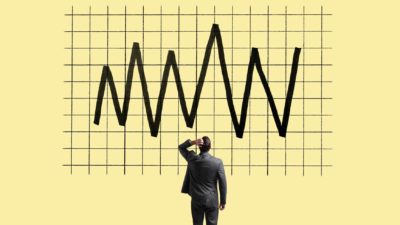So, this week's GDP numbers?
I've been asked about them, repeatedly, on TV, radio and online over the past 48 hours, so I thought I'd try to lay my thoughts out, here, for our readers and members.
(And a warning: I have no party-political affiliation or dog in this fight. So, depending on your leaning, you won't like everything that follows. Stick with me, anyway…)
GDP growth of 0.2% for the quarter is… poor. 1% for the year is, too.
It's worse than some were predicting (though predictions should be left for carnival sideshows.)
It's better than some had feared.
It's also… not very useful. And there's two reasons.
First, GDP-per-capita has gone backwards for 7 of the last 8 quarters.
That is, the economy, measured on a per-person basis, has been smaller for 21 of the last 24 months. That's… not good.
Second, GDP growth has been 0.2% for the past two quarters, but in each of those quarters, government spending has added 0.3% to the GDP numbers.
In other words?
In other words, we are in both a per-capita recession and a private-sector recession.
Neither of those is good.
They would be acceptable – just – if the result was in service of inflation being back squarely in the RBA's target band of 2-3%. But of course it's not, and is higher than the RBA expected by now.
So we have inflation that's too high, a private sector that's struggling, and we have a slightly larger pie, but with smaller slices.
(If the per-capita thing doesn't make instinctive sense, let me use a rough analogy I've mentioned before: if, at a staff meeting, the boss said "Good news, the salary budget is up by 10%… but staff numbers are up 20%, so everyone gets a pay cut", it wouldn't exactly be well received!)
Both of those reasons – per-capita and private vs. public – are why I don't think it's very useful to focus only on the 'top line' GDP result.
The only bit of good news from the GDP figures? It's likely that if/when we do enter a 'total economy' recession, the screaming headlines in the newspapers will cause a psychological reaction that'll make things worse (we'll feel worse off, and probably stop spending, making things even worse). So, given the slavish – and incorrect, in my view – preference for 'Total GDP' over 'per capita GDP', avoiding a recession on the former basis would at least be a net positive.
If you're wondering, GDP itself is a terribly crude measure of national wellbeing, too. Even the bloke who came up with the concept warned us not to overuse it. (Just one more in the long line of people who have seen their inventions misused…)
It reasonably approximates national economic output. So it's useful for that.
But it doesn't measure per-person output, as mentioned. Not only that, but it doesn't measure social, environmental or wellbeing outcomes. It ignores happiness, leisure and inequality.
Oh, and an interesting quirk: if, say, there was an asset-destroying earthquake, GDP would rise when those buildings were rebuilt… even though there would be no net increase in the value of the things we owned afterwards.
We should remember that the economy is really important, but that it also only exists to serve our society, not the other way around. In fact, the 'economy' isn't really a thing at all… it's just what we call the sum total of our financial interactions as we go about our daily lives.
Okay, enough philosophising. Where are we, what's next and what should be done?
I'm glad you asked. (If you didn't, just pretend you did!)
The biggest economic issue remains inflation. It steals our purchasing power, and makes us all poorer. Worse, while economic cycles come and go, price increases are forever.
Rough guess… we've probably lost a decade or more in purchasing power over the past 5 years – a time when our purchasing power should have increased, instead.
True, much of that was because of an unexpected and unavoidable pandemic… but the responses to said pandemic, at the time and since, are part of the problem.
So, if I had the ear of the RBA Governor or the Treasurer, I'd be very, very clear that – politics be damned – job number one, above all others, is to get inflation down, as fast as is responsibly possible.
Unfortunately, the RBA is trying, but seems to be erring on the side of over-caution.
Unfortunately, the government says it's trying, but the evidence of same is almost entirely lacking.
But if they both did, wouldn't that cause a recession? Possibly, yes. But as I said, above, we're already in a per-capita and private sector recession, so I'm not sure what we're still trying to 'avoid', other than a headline.
Shouldn't we avoid a recession at all costs? No. And if that sounds surprising (or callous), let me explain:
See, we've been told for decades that a recession is the worst thing that could happen to an economy. And you know why? Because we either forgot that ongoing inflation is worse, or we just assumed it couldn't happen again, making a recession public enemy number one.
Unfortunately, we now know better. Recessions are awful. Persistent inflation is worse.
Because, as I said, recessions come and go. Inflation causes higher prices to come and stay.
I don't want a recession. People will lose their jobs. Businesses will fail. It will feel awful.
But we're not choosing between a good option and a bad one.
We're choosing between two bad options, and persistently higher prices is the worst.
(We should, though, increase unemployment benefits from their disgracefully low level, on two moral planes: one, because it's just humane, but two, because we need to acknowledge that the price of our prosperity, as a nation, is that sometimes people lose jobs, and some of those for very long stretches of time.)
Could we magically protect those jobs? No. We could have a national 'job guarantee', with government funded roles doing meaningful work for those who wanted it, but we can't magically make the economy operate at 0% unemployment. And that funding has to come from somewhere, of course.
Phew. That's some pretty dense stuff. It's hard to tackle concepts like GDP, inflation and employment and do them all complete justice in a single written piece like this one.
But given the ongoing questions, I wanted to do my best to address them… hopefully in an understandable and non-partisan way.
The solutions? That's a whole other article, but given my druthers, I'd have the governments (yes, plural: state and Federal, LNP and Labor) run structurally balanced Budgets so that demand is automatically removed from the economy when things are running too hot (like, say, now) as a starting point. That would probably do most of the heavy lifting, to be honest.
We could (and should) vary compulsory Superannuation contributions to add or remove demand, too. We could (and should) enact both spending and tax decisions to help. But the structurally balanced Budget isn't hard, and shouldn't be controversial.
I continue to hope we avoid a capital-R recession, but given the two that we're in (per-capita and private sector), whether we avoid a total one is a little academic. Perhaps we can just settle for hoping things don't get too much worse before they start getting better.
And that inflation is brought under control before either the RBA or the government blink.
Fool on!









